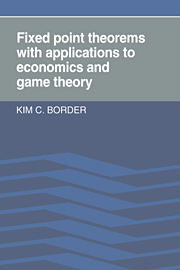Book contents
- Frontmatter
- Contents
- Preface
- 1 Introduction: models and mathematics
- 2 Convexity
- 3 Simplexes
- 4 Sperner's lemma
- 5 The Knaster-Kuratowski-Mazurkiewicz lemma
- 6 Brouwer's fixed point theorem
- 7 Maximization of binary relations
- 8 Variational inequalities, price equilibrium, and complementarity
- 9 Some interconnections
- 10 What good is a completely labeled subsimplex
- 11 Continuity of correspondences
- 12 The maximum theorem
- 13 Approximation of correspondences
- 14 Selection theorems for correspondences
- 15 Fixed point theorems for correspondences
- 16 Sets with convex sections and a minimax theorem
- 17 The Fan-Browder theorem
- 18 Equilibrium of excess demand correspondences
- 19 Nash equilibrium of games and abstract economies
- 20 Walrasian equilibrium of an economy
- 21 More interconnections
- 22 The Knaster-Kuratowski-Mazurkiewicz-Shapley lemma
- 23 Cooperative equilibria of games
- References
- Index
11 - Continuity of correspondences
Published online by Cambridge University Press: 16 January 2010
- Frontmatter
- Contents
- Preface
- 1 Introduction: models and mathematics
- 2 Convexity
- 3 Simplexes
- 4 Sperner's lemma
- 5 The Knaster-Kuratowski-Mazurkiewicz lemma
- 6 Brouwer's fixed point theorem
- 7 Maximization of binary relations
- 8 Variational inequalities, price equilibrium, and complementarity
- 9 Some interconnections
- 10 What good is a completely labeled subsimplex
- 11 Continuity of correspondences
- 12 The maximum theorem
- 13 Approximation of correspondences
- 14 Selection theorems for correspondences
- 15 Fixed point theorems for correspondences
- 16 Sets with convex sections and a minimax theorem
- 17 The Fan-Browder theorem
- 18 Equilibrium of excess demand correspondences
- 19 Nash equilibrium of games and abstract economies
- 20 Walrasian equilibrium of an economy
- 21 More interconnections
- 22 The Knaster-Kuratowski-Mazurkiewicz-Shapley lemma
- 23 Cooperative equilibria of games
- References
- Index
Summary
Remark
A correspondence is a function whose values are sets of points. Notions of continuity for correspondences can traced back to Kuratowski [1932] and Bouligand [1932]. Berge [1959, Ch. 6] and Hildenbrand [1974, Ch. B] have collected most of the relevant theorems on continuity of correspondences. It is difficult to attribute most of these theorems, but virtually all of the results of this chapter can be found in Berge [1959]. Whenever possible, citations are provided for theorems not found there. Due to slight differences in terminology, the proofs presented here are generally not identical to those of Berge. A particular difference in terminology is that Berge requires compact-valuedness as part of the definition of upper semi-continuity. Since these properties seem to be quite distinct, that requirement is not made here. In applications, it frequently makes no difference, as the correspondences under consideration have compact values anyway. Moore [1968] has catalogued a number of differences between different possible definitions of semi-continuity. The term hemi-continuity has now replaced semi-continuity in referring to correspondences. It helps to avoid confusion with semi-continuity of real-valued functions.
The chief use of correspondences in economic and game theoretic problems is the linking up of multi-player situations and single-player situations. For example, the problem of finding a maximal element of a binary relation as discussed in Chapter 7 is a single-player problem. The solution to the problem does not depend on the actions of others.
- Type
- Chapter
- Information
- Publisher: Cambridge University PressPrint publication year: 1985



